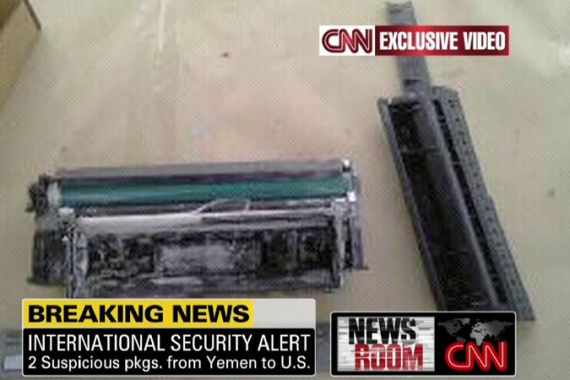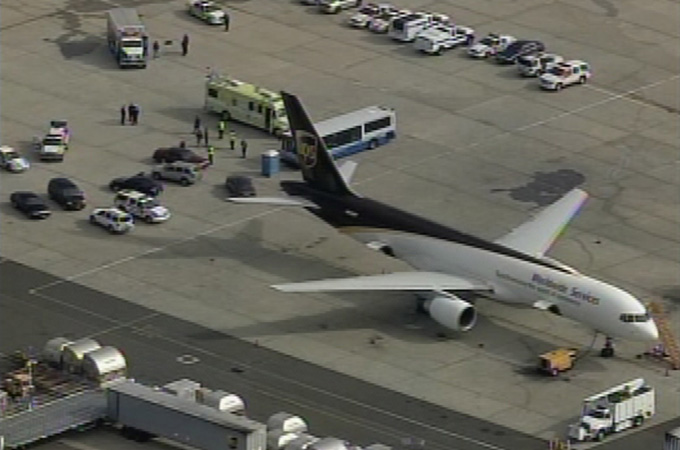Timeline: Foiling Yemen parcel plot
Soon after receiving a tip from Saudi Arabia, officials in several countries foiled a plot to bomb Jewish worship sites.

 |
|
A worldwide response to the discovery of the explosive-packed packages included the isolation and search of UPS planes and a truck in New York City and the escort by fighter jets of an Emirates passenger flight |
The discovery on Friday of two packages bound for Jewish sites and packed with explosive material was the latest in a series of terrorist threats to the United States from the air.
Following the 9/11 attacks, when three passenger jets crashed into the World Trade Center in New York City and the Pentagon, killing thousands of people, other suspected al-Qaeda plots utilising air travel have emerged.
In December 2001, Richard Reid, a British citizen, tried to ignite explosives packed into his shoe on a flight from Paris to Miami.
In August 2006, three British citizens were arrested for plotting to use bombs disguised as drinks to blow up flights from London to the US and Canada.
In December last year, Umar Farouk Abdulmutallab, a 23-year-old Nigerian who had trained with al-Qaeda in the Arabian Peninsula, failed to detonate explosives hidden in his underwear on a flight from Amsterdam to Detroit.
The latest plot appeared to have been foiled quickly, as authorities in countries thousands of miles apart discovered the packages before they became airborne and moved to contrain other possible threats. All of the following entries refer to the local time in Washington, DC.
British police are called to East Midlands airport in Nottingham at around 3:28am local time. They find the first package on a UPS flight – a Boeing MD11. The package contains a modified ink cartridge from a computer printer reportedly packed with pentaerythritol tetranitrate (PETN), the same high explosive powder Abdulmutallab attempted to ignite in December.
Shortly thereafter, a similar package – a Hewlett Packard printer containing an ink cartridge stuffed with explosive powder – is found in a FedEx sorting facility in Dubai.
John Brennan, US president Barack Obama’s homeland security and counterterrorism adviser, first informs Obama of a “credible terrorist threat”. It is unclear how soon this notice came after Saudi Arabia provided the US with the tip that led to the discovery of the explosive-packed parcels.
Brennan has a conference call to discuss the threat with Janet Napolitano, head of the homeland security department, Robert Mueller, director of the Federal Bureau of Investigations, the chiefs of the Transportation Security Administration and National Counterterrorism Center and others from the Central Intelligence Agency. Morning is just beginning in England and Dubai.
Brennan holds another conference call with a group of officials from the intelligence community and other agencies, including the Federal Aviation Administration, State Department and Coast Guard, to share information about the threat.
Brennan speaks on the phone with Ollie Robbins, the UK administration’s deputy security adviser, to receive an update about the East Midlands package.
Around two hours later, Brennan and Robbins speak again about the package. It’s possible there is some doubt among UK authorities over whether the package actually contains an explosive device.
Brennan holds a secure video teleconference to update the same group of US intelligence, security and transportation officials he spoke with the night before.
Authorities in the United Kingdom, who reportedly at first doubted that the device they discovered was a bomb, recheck the ink cartridge and confirm that it is.
Brennan calls Ali Abdullah Saleh, the president of Yemen, to discuss the threat. Al Jazeera’s Hashem Ahelbarra, reporting from Aden, says Brennan gave details about the packages to Saleh, while Saleh pledged that Yemen will “do its best” to track down the source.
The Yemeni government has declined to confirm whether it believes al-Qaeda in the Arabian Peninsula has anything to do with the bombing attempt.
Brennan calls Mueller, the FBI director, for the second time and shortly thereafter calls Robbins for the third time.
Brennan and other members of the president’s national security team discuss the threat with Obama at the President’s Daily Brief, a routine and highly classified overview of international intelligence.
Authorities at East Midlands airport lift a security cordon they had put in place during the initial response.
Two UPS planes at an airport in Philadelphia and one at an airport in Newark, New Jersey, are isolated, moved away from terminals and searched. A UPS truck in New York City is stopped on the street and also searched. Brennan later says this is because all were carrying cargo from Yemen.
After the United States receives information that there is cargo from Yemen on board Emirates airline flight 201 from Dubai to New York City, Canada and the United States scramble fighter jets to escort the flight to John F Kennedy International Airport.
Obama delivers prepared remarks to reporters at the White House. He summarises the investigation and says that the two packages originated in Yemen and were bound for “two places of Jewish worship in Chicago”. He also links the threat to al-Qaeda in the Arabian Peninsula, an offshoot of the Osama bin Laden-led group viewed in the United States as a rising threat.
Brennan and Robert Gibbs, Obama’s press secretary, brief reporters for half an hour. Though some media outlets have speculated that the two packages were a “dry run,” Brennan says “they were in a form that was designed to try to carry out some type of attack”. He declines to discuss the amount of explosives in the packages or the damage they could have caused. Al-Qaeda has shown “over the years” that it will focus on launching attacks through the aviation sector, he says.
Brennan calls the Yemeni authorities “courageous partners” in the battle against al-Qaeda and says that co-operation with Yemen has improved over the past 22 months. Brennan says he has visited the country four times in two years.